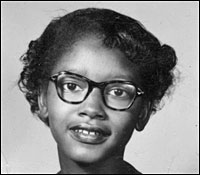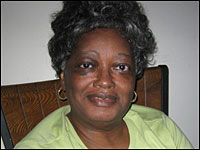

CLAUDETTE COLVIN:
THE BRAVE YOUNG WOMAN
WHO WENT BEFORE ROSA PARKS
PDF
By Nick Gier, Professor Emeritus, University of Idaho (ngier@uidaho.edu)
Click here for many other columns on civil rights
Claudette gave all
of us moral courage. If she had not done what she did,
I am not sure that we would have been able to mount the support for Mrs. Parks.
--Fred Gray, Alabama civil rights attorney
It would be
impossible to tell the story of the civil-rights
movement without Claudette. Rosa Parks has to scoot over a little bit.
Phillip Hoose, Claudette Colvin: Twice Toward Justice
Nine months before Rosa Parks refused to give up her seat on a Montgomery bus, 15-year-old Claudette Colvin did the same and was arrested for violating segregation law, disorderly conduct, and assault. She should have been taken into juvenile detention, but instead she was locked up, without a chance to phone her family, in the city jail.
Colvin found that she was fully prepared for her act of civil disobedience. At Booker T. Washington High School that month she and her classmates had been studying African American history. Later Colvin would reminisce: "I felt like Sojourner Truth was pushing down on one shoulder and Harriet Tubman was pushing down on the other—saying, 'Sit down girl!' I was glued to my seat."
Now 67 and retired from her job in a New York City nursing home, Colvin admits that she may have scratched the policemen who kicked her, yanked her out of her seat, and handcuffed her. The police said that she was spewing obscenities, but Colvin categorically denies that, countering that it was the police who called her a “whore” and “n----r bitch” and “cracked jokes about parts of my body.”
Colvin was afraid that she was going to be raped, and she says “I recited the Lord's Prayer and the Twenty-third Psalm over and over in my head, trying to push back the fear.” After her pastor bailed her out of jail, the fears continued: “It would have been easy for the Klan to come up the hill in the night. Dad sat up all night long with his shotgun. We all stayed up.”
Long before Colvin and Parks there had been protests against this bus system, and Montgomery was the only southern city where blacks were required to give up their seats. In the late 1940s at least five women and one man were fined for refusing to take the back rows that Jim Crow had reserved for them.
In 1952 a Montgomery bus driver called the police on a black man named Brooks who refused to enter the back door. There was a scuffle and the cop shot and killed Brooks. An investigation ruled that it was a justified homicide because Brooks was resisting arrest.
Although three quarters of Montgomery bus passengers were African American, ten of the 36 seats were reserved for whites only. Jo Ann Robinson, then an English professor at Alabama State College, writes that “the ten empty seats became an obsession to weary workers. The number ten became a damnable number . . . Nobody wanted that number on anything that belonged to him.”
Robinson’s Women’s Political Council was responsible for initiating the successful 381-day Montgomery bus boycott. David Garrow, author of Bearing the Cross, reminds us that civil rights activists were "often young people and often more than 50 percent women." Even Rosa Parks complained about sexism in the movement and the tendency for the black men in suits to take credit for all the victories.
The gutsy Colvin was different from the previous protestors because she refused to pay the fine and pled not guilty at her trial. Curiously, the charges of disorderly conduct and violating segregation laws were dropped, but this thin rail of a girl was convicted, incredibly enough, of assaulting a police officer.
A neighbor described Colvin as a "bookworm" and "always studying and using long words." In her book The Montgomery Bus Boycott and The Women Who Started It, Professor Robinson maintains that "she was an A student, quiet, well-mannered, neat, clean, intelligent, pretty, and deeply religious." When her teacher asked her students what they wanted to be, Colvin wrote down “President of the United States.”
A bus boycott had been on the minds of black leaders for some time, but they decided that Parks, rather than Colvin, was the person who would be the best symbol for the boycott. In his award-winning book Parting of the Waters Taylor Branch states that Colvin’s "circumstances would make her an extremely vulnerable standard-bearer."
What were some of these “circumstances”?
· She was thought to be emotional, unstable, and therefore unreliable.
· She wore her hair in cornrows and refused to straighten it as most black women did.
· She became pregnant early in 1956 in what she said was a non-consensual relationship.
For these reasons civil rights leaders informed Colvin that they would not support an appeal of her conviction. Mary Louise Smith, another black woman who also refused to give up her seat in another incident, was also advised to pay her fine, presumably because her father was accused (wrongly, according to Smith) of being an alcoholic.
Rosa Parks was very frank about Colvin’s situation: "If the white press got hold of that information, they would have [had] a field day. They'd call her a bad girl, and her case wouldn't have a chance. So the decision was made to wait until we had a plaintiff who was more upstanding before we went ahead and invested any more time, effort, and money."
With the support of the 26-year-old Martin Luther King, Jr. and other black leaders, Colvin and three other women did file suit against the city of Montgomery. In May of 1956 they gave testimony and in December of the same year the Supreme Court ruled in Browder v. Gayle that the Montgomery bus system violated African American constitutional rights.
Interviewed recently Colvin said: "I'm not disappointed. Let the people know Rosa Parks was the right person for the boycott. But also let them know that attorneys took four other women to the Supreme Court to challenge the law that led to the end of segregation."
In his book Claudette Colvin: Twice Toward Justice, which won the 2009 National Book Award for Young People’s Literature, Phillip Hoose claims that “it would be impossible to tell the story of the civil-rights movement without Claudette. Rosa Parks has to scoot over a little bit."
On the day of her arrest Colvin had just turned in a paper about her people not being allowed to try on clothes at Montgomery stores. This reminded me of the doctrine of untouchability, which is still, despite laws against it, followed by tens of millions of Indians.
In Hoose’s book Colvin remembers an incident in which, as a four-year-old, she allowed a white boy to touch her. With the white mother nodding her approval, Colvin’s mother slapped her in the face and shouted “Don’t you know you’re not supposed to touch them?” Only fifty years ago Americans were enforcing their own doctrine of untouchability.
As a disgraced unwed mother, rejected by blacks and whites, Colvin fled to New York to find work. Working as a domestic, she was shocked when the lady of the house piled her dirty clothes on top of hers and asked her to wash them together. Colvin declared: "That's when I knew I was out of the South. That could just never have happened there."
Let me conclude with Colvin’s most recent experience of great hope for America: "Being dragged off that bus was worth it just to see Barack Obama become president, because so many others gave their lives and didn't get to see it, and I thank God for letting me see it."
Nick Gier taught philosophy at the University of Idaho for 31 years.